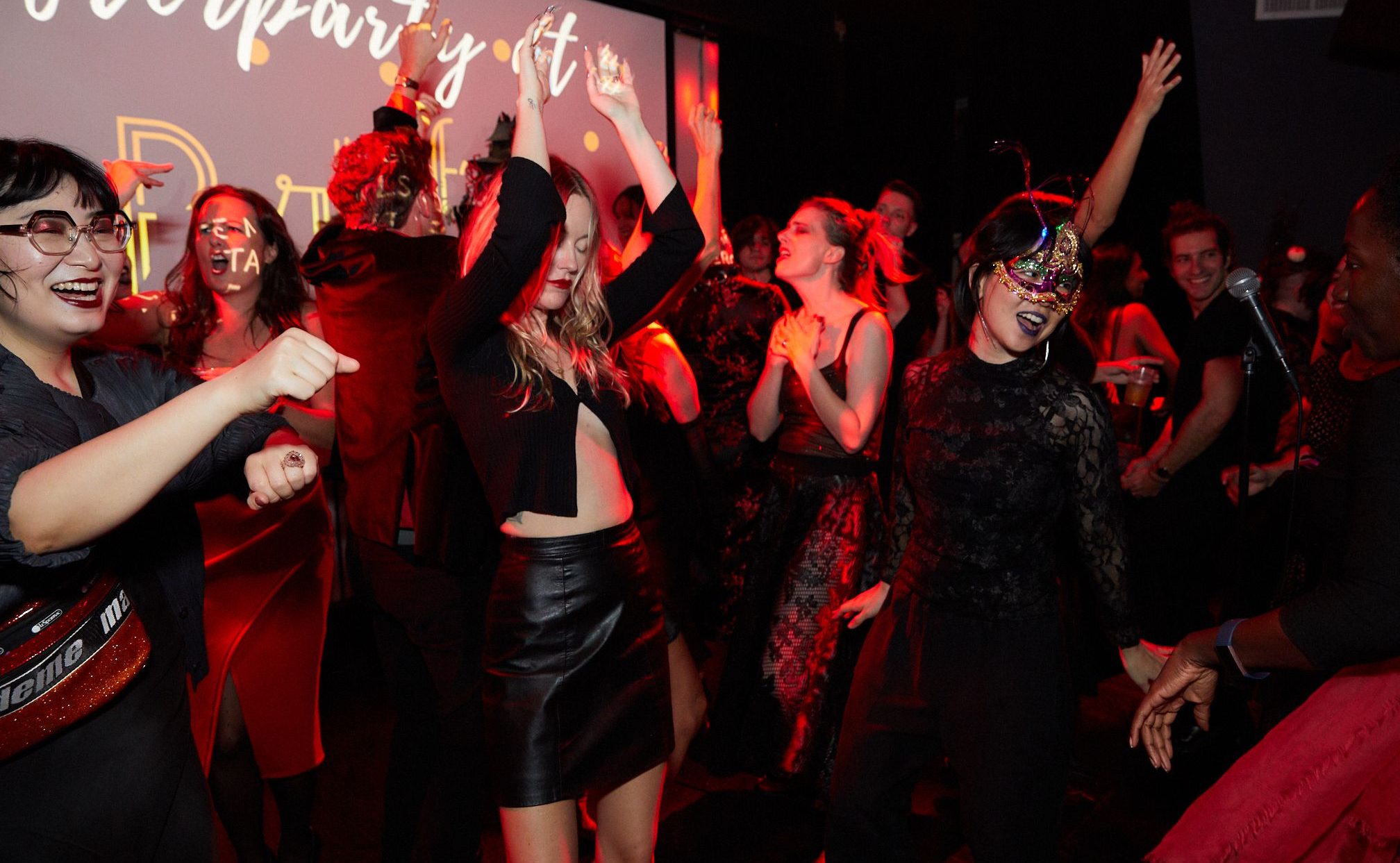news
Demisemiquavers: UNSAID 6 Launch @ KGB

1. Ian Lirenman, whose story “The Canadian” is in the new issue, asked me if he looked too baked. I didn’t think so. Can anyone really be too baked? 2. David McLendon being awesome. He gave me a pin. 3. Pamela Ryder. Every time she read “purveyor of boxes” I wanted to hide in fear. Sweet.
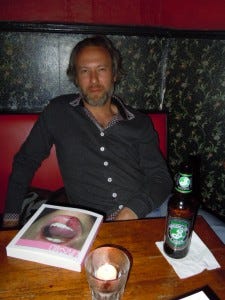
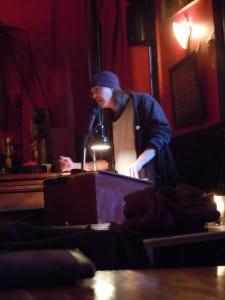
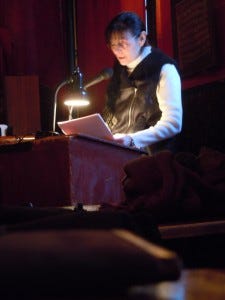
I walked into East Village’s Kraine Gallery Bar — otherwise known as KGB — while it was day outside, which was weird. Its red curtains and Soviet-era relics immediately separated me from the sunny glory outside, and then a Russian man with a camera wanted me to say some things for Russian (and Belarusian) TV, if I felt comfortable inside a bar called KGB. I said yes. This strange preface to last night’s incredible launch party for UNSAID’s sixth issue seems too perfect. The journal consistently publishes disarming, demanding, and elusively powerful fiction and poetry that delves deep into places many are afraid to wander, both as readers and writers. I compare a reader’s performance to a band’s often, but the pieces from Brian Kubarycz, Katherine Manderfield, Pamela Ryder and Robert Lopez last night were the most metal in both content and tone I’ve ever heard. Sort of like these guys.
1. Allison Grillo, Student of Libraries at Pratt Institute, with Diane Wright, Professor of Decorative Arts at RISD. They were housing McLendon and Kubarycz. Sweet people, those two. 2. Robert Lopez and waitress b00bs.
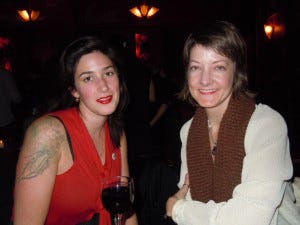
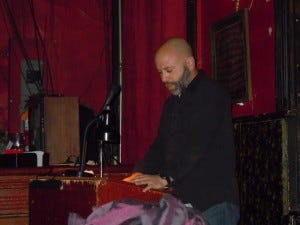
The evening’s first reader, Pamela Ryder, read “The Details of Grief,” which finds a woman deciding which coffin to buy her recently deceased father. Ryder’s beautifully constructed sentences rendered her character’s experience grimmer than I could have ever imagined. “She looks for where a box such as this may be opened, so fine the carpentry is … ‘Allow me,’ says the purveyor of boxes, moving beside her … A nudge so slight to have her step aside.” I found myself shifting uneasily. Though a part of me unconsciously yearned for a more digestible version of Ryder’s tale, I couldn’t stop listening, and had to tell myself to write notes. “The problem of the jacket … The tendency to decompose being preferable. Because things such as this, such a thing as a zipper — would not.” Ryder took us to a place, kept us there, and made us listen. Call it gluttony for bleakness, but I loved it.
Katherine Manderfield was next and read a selection from her piece “House, Box, World.” The strain of fiction typical in UNSAID’s pages is often concerned with acoustics and rhythm, but also negative space. Manderfield elongated the typical pause between sentences, lending lines like “The house was dark and yawning. The boards warped and buckled by water. By winter. Stairs creaked,” more time to sink in and have a chunkier, heavier impact. In his introduction, UNSAID editor David McLendon noted that descriptions through declarative sentences describe less than emote. The “plot” of Manderfield’s piece was shadowed by her short but heavy sentences to massive effect, and laid heavy on the audience’s ears.
1. The well-dressed Katherine Manderfield, reading about a box. 2. The man himself, Brian Kubarycz. We liked each other’s hair.
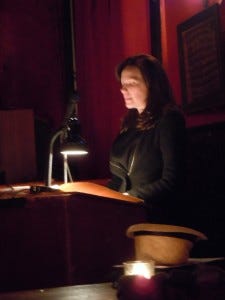

After a short intermission, McLendon launched into an anecdote concerning the evening’s next reader, Brian Kubarycz. In the beginnings of UNSAID, McLendon “fell in love with a girl named Samantha,” referring to one of Kubarycz’s first pieces in the journal. McLendon needed to “read it again,” and Kubarycz responded by writing a second part to that story, titled “Over the Mountain.” Kubarycz’s piece proves that a “serious writer” can produce a piece in a genre that isn’t “literary fiction” and floor people. His story simmered at the edge of boil throughout. “Samantha harkened to Elders entire, as if their dim recitals and fair tales of distant granaries were worth more to her, and rang truer, than the battle hymns we sang before breaking open loaves as big as heads of cabbage.” I cannot emit any more of that sentence because it would discredit its awesomeness. Kubarycz also read words like “nurselorn” and “demisemiquaver” in earnest, and it worked. All of you should find Kubarycz’s work on the internet. It is awesome.
The evening closed out with a fantastically hilarious reading from Robert Lopez. Lopez read two pieces that aren’t in the issue, and I only managed to get one line down from the first. I was laughing too hard. “I wondered if she participated in after-school activities like bowling or girl scouts. This is what I thought when I had my hands on her tits.” Lopez’s next piece, equally funny but a bit darker, is either titled “Isle of Wight” or “Isle of White.” “I don’t even know what it looks like. I think it’s spelled White or Wight.” Lopez steadily increased his volume and intensity, nearly eating the mic when he read this funny and sad line: “Are you ready for the truth? I don’t think you’re ready. You look unwell … Make an appointment for the doctor, maybe. You’re not ready.”
“I’m gonna keep saying this over and over again,” David McLendon began the night, “but if there any publishers out there tonight and if you want the real deal, they’re all right here.” I rarely hear editors say this at an event, and if they do it comes off gimmicky and insecure, but McLendon’s face was no bullshit: he loves his writers and what they do. UNSAID 6 comes highly recommended, and you can order it here.
***
— Ryan Chang is from Orange County, CA and lives in Brooklyn. He is the Staff Writer for The Outlet, and his work has previously appeared on Thought Catalog. He is in the internet here and here.







